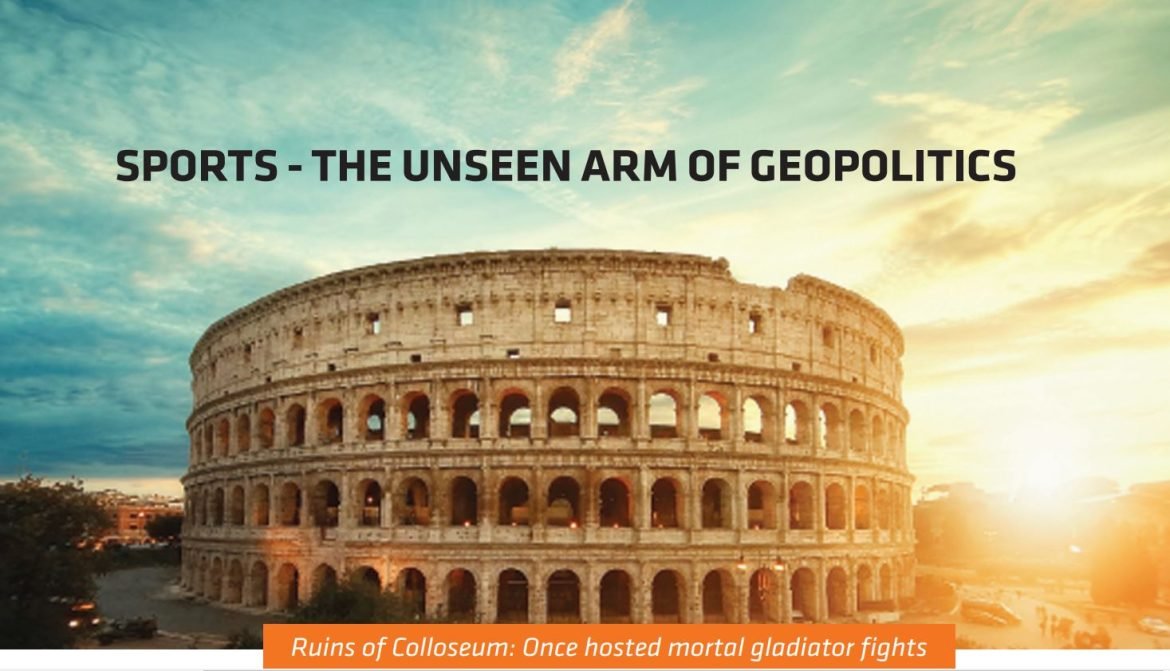‘Don’t mix politics and sports’, a quote we have said or heard in any good sporting debate amongst peers. Most governing associations of sports do strongly promote a similar message. But the toxic relationship between sports and politics, are a sour universal truth. Sports, even at its most contentious, is the most proven equilibrium for peace and calm. But if the history of organized sports can be analysed, sports has always been used for political purpose. Sports have always been a part of human society. From the ancient Greeks to the modern day, sports have been used as a way to settle disputes, build camaraderie, and even as a tool of diplomacy. In recent years, however, sports have taken on a new role in the geopolitical arena. MIR ARMAN FARUK writes an op ed.
ANCIENT OLYMPICS & ROMAN GLADIATOR GAMES
From the dawn of history or even pre-history traces of organized sports can be found. Across the Mediterranean region athletic scenes can be found in the tombs of kings and nobles of ancient Egypt and Mesopotamia. The most prolific is the Olympic Games of ancient Greece. While there are prehistoric traces of the games, but first historical record of the game was 776 BC given by Aristotle. The games were held in honour of God Zeus, with a mythological origin. During the period of the games, the Ekecheiria, an Olympic truce, was announced so that athletes and religious pilgrims could travel from their cities to the games in safety. The theological posture with pan-Hellenistic camaraderie made the game an annual ritualistic event.
Also you can read another article about: Avik Anwar: Racing Champion, Passionate Driver, Patriotic Soul
Soon the game became a political tool for the city states to affirm dominance over their rivals. In the background of the games political leaders made alliances or declared war by priests making sacrifices. When Romans conquered Greece, Emperor Augustus used the Olympics as a pacifying tactics to integrate Roman and Greek culture. But while Augustus used the games for good, Nero used it build a personal cult status. Nero infamously claimed victory in 10 chariot races despite being thrown off to the ground. He included music and singing in the competition and bribed his way to top in the singing competition. He tried to create a cult of personality through these games, a strategy we still see in modern day politics.
Most Roman influence in sporting history was the Gladiator fights. Armed combatants fighting with each other or animals, often to death, was an integral part of Roman political chains. For the ruling class these games were a chance to showcase popularity amongst citizens. The origin of the gladiator fights is often rooted to the Punic Wars of 3rd century BC fought between Rome and Carthage (modern day Tunisia). The legacy of the war built a rigid militaristic lifestyle for Romans which was propagated through this brutal real fight scenarios played out by gladiators inside an arena. Huge arenas and colosseums for fighting were built to signify the greatness of Rome.
In this Roman practice you can find the grandest scale, significant and brutal geopolitical strategy of the time period in using slaves in the fights. When Rome conquered a land, it subjugated the vanquished army personnel as slaves. This slaves in return were used in the gladiator fights for the ‘Glory of Rome’. The winner of a tournament of fights were given their freedom. The conquered citizens of the colonies were sold into the false sense of pride and established a common sense of identity through these fights. Rulers used the fights to distract citizens from food shortage, famine, plague, war and natural disasters. The strategy of ‘hope of freedom’ was a true masterstroke of geopolitics.
Modern Olympics, Colonial Bigotry and Rise of the Nazism
In 1894, the Olympic Movement was founded by a French national Baron Pierre De Coubertin, taking inspirations from the Ancient Olympic games. He created the International Olympics Committee (IOC) which organized the first Modern Olympic games in Athens in 1986. The IOC is run with a defined structure and set of rules founded in the ‘Olympic Charter’. The mission of the IOC is to promote Olympism throughout the world and to lead the Olympic Movement. The fundamental principles of Olympism are:
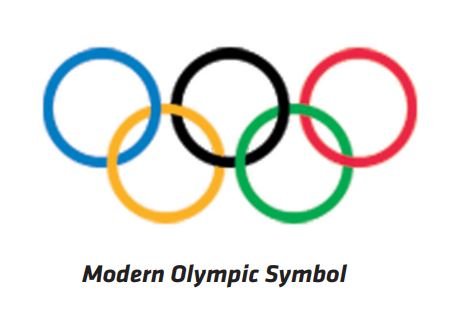
1. Olympism is a philosophy of life, exalting and combining in a balanced whole the qualities of body, will and mind. Blending sport with culture and education, Olympism seeks to create a way of life based on the joy of effort, the educational value of good example, social responsibility and respect for universal fundamental ethical principles.
2. The goal of Olympism is to place sport at the service of the harmonious development of humankind, with a view to promoting a peaceful society concerned with the preservation of human dignity.
3.The practice of sport is a human right. Every individual must have the possibility of exercising sport, without discrimination of any kind and in the Olympic spirit, which requires mutual understanding with a spirit of friendship, solidarity and fair play.
4. The enjoyment of the rights and freedoms set forth in this Olympic Charter shall be secured without discrimination of any kind, such as race, colour, sex, sexual orientation, language, religion, political or other opinion, national or social origin, property, birth or other status. (International Olympic Committee, 2020) With these principles the Olympic Games are seen as a beacon of light for peace and human rights. And in its truest form it could be. But the commentary found in Revue Olympique 73 by the same founding father Baron Pierre De Coubertin says, “Sport and Colonialism are natural companions”. He called sports “a vigorous instrument of the disciplining” of colonized people, and viewed it as a calming force in the French colonial empire. Thus Raphaël Verchère, a sports philosopher founded, “First, Coubertin does not understand peace as a condition which excludes human conflicts. Second, he defined sports as a means for social control. Third, in Coubertin, sports are not directly a means to promote pacifist ideals. Rather, peace appears as means to promote the values and ideas embodied by the sportsman.”
If the history of Modern Olympic games is observed with a grey shade of glasses, you can see the geopolitical strategies of old-colonial or neo-colonial powers are deeply engraved with sports. The signs can be found from the earliest editions of the games. In 1904 Summer Olympics held in St Louis, Missouri (the first Olympics held in North America) assimilated ‘Anthropology Days’ prior to the games. According to the National Geographic magazine, there was a debate within the athletic and anthropological community at the time as to whether people of colour from colonized countries were natural athletes.
So, they did experiments to prove the veracity of this racist anthropology. They gathered people from different ethnic backgrounds and got them to perform Olympic sports, then tested their times and performances against white, collegiate American athletes. A more cringing sideshow was a Human Zoo where, fourteen hundred indigenous people from Southeast Asia, the Pacific Islands, East Asia, Africa, the Middle East, South America and North America were displayed in anthropological exhibits that showed them in their natural habitats The sheer brilliance, for lack of a better word, of geopolitical strategy and propaganda were played out in 1936 Munich games. Nazi party took full control over Germany in 1933 and Adolf Hitler became the sole dictator. In 1935 Nazis passed the infamous Nuremberg Law. The law codified a race superiority system, where white Aryans were at the top and Jews and other Semite people were at the bottom. In the aftermath of first World War, Germany was already vilified. Hosting of the Olympic Games gave the Nazis a perfect stage to propagate their agenda.

Prior to 1936 Games, the opening ceremony had little significance of ritual gratification. The Nazis put on a massive show that we still find in modern sporting events. The grandiosity and lavishness of the ceremony awed the international audience and pacified all the negative connotation attached with the Nazi regime. The event was organized with clockwork discipline, extreme cleanliness and overall joyous tone. The world took it as an example of good governance, economic marvel and social harmony. Nazis used this gratification to hide their real agenda of crimes against humanity and raging war.
This formula of using sporting mega events such as Olympics, FIFA World Cup etc, for strategically diverting or corroborating different ideologies in geopolitics. During the Cold War period Sports was used as a weapon to propagate ideologies of democracy and communism. Boycotting sporting events hosted by opposing sides were used as a geopolitical tool. Also, to put Coubertin’s commentary in perspective only a handful of countries outside of western hemisphere has hosted Olympics, none from Africa.
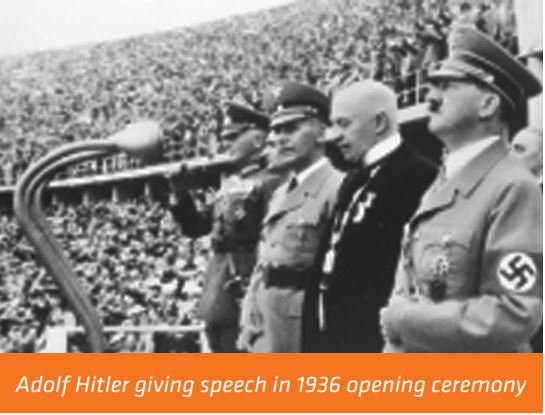
Those who hosted outside of the western bloc usually have their own geopolitical or neo-colonial ambitions (China, Brazil) or gives proxy to superpowers’ strategy (South Korea, Japan, Australia). Qatar, the host of upcoming FIFA World Cup has well known geopolitical ambitions in Middle East.
INFORMATION ERA AND SOFT POWER OF SPORTS
From the late 20th century emergence of satellite technology have made entertainment industry a tool of exporting cultural influences beyond borderlines. Western superpowers such as USA and European Union use different aspects of entertainment industry which sports is a part of to preach their geopolitical influences by co-opting rather than coercing. This ability is known as soft power. Soft power is seen as a very potent tool in global and regional geopolitical strategy. And with the rise of Internet, the ability of soft power went from people’s living rooms to palm of their hands. Sport broadcasting through television and internet is now trillion-dollar industry. So, the international economic strategy also became supplementation of geopolitical influences. Football, Cricket and Basketball became the most dominating team sports out of the gate. These historically western sports went into billions of hearts in Asia and Africa. The individual sports such as boxing, tennis and racing also went to gained huge audiences in their own rights.
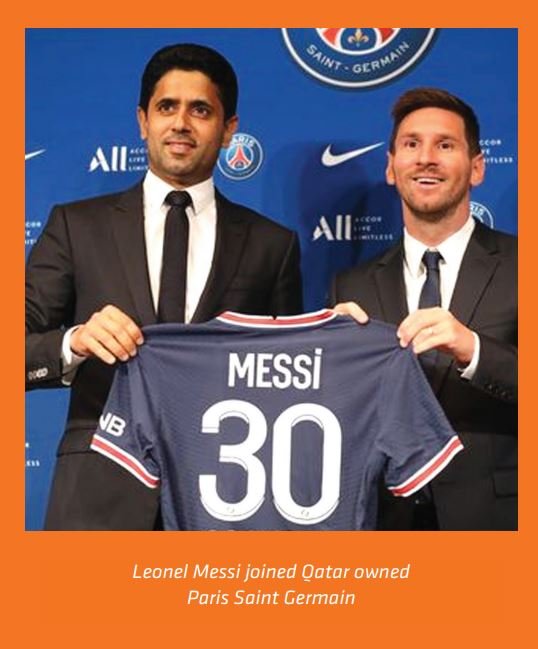
From the dawn of the millennium the usual side watchers in global politics started to become stakeholders in sporting teams. The huge influx of petrodollars in Middle Eastern made them economic giants overnight. Fossil fuel also pulled Russian oligarchs out of the lose of cold war to the high lane of luxury. In 2002, Roman Abrahimovic, a Russian oligarch bought Chelsea FC, a football club in England. Soon, the middle eastern sheikhs brought their financial might in European soil. Manchester City became a football giant after being bought out by Abu Dhabi United Group, a subsidiary of Abu Dhabi’s royal family. Qatar Sports Investment, owned by Qatari royal family, bought out Paris Saint Germain, the most prestigious club in France. This season PSG made a big splash by signing Leonel Messi, arguably one of the greatest players ever.
This huge investments in return gave the individual owners native countries rights to host some of the biggest footballing events. Russia hosted Euro 2016, UAE is now the preferred venue of annual event of FIFA World Club Cup and Qatar will host 2022 FIFA World Cup. The significance of the hosting rights is used to counter the general perception of economic corruption, human rights abuse and media suppression among these countries. Hosting dignitaries and business personnel from across the world in these events also provides a direct way of communication which is a significant step in geopolitical chess board.
The Chinese also use sports in their diplomatic arsenal. ‘Ping Pong Diplomacy’, series of event in early 1970s, refers to exchange of table tennis players between USA and China. It paved the way for better US-China diplomatic relation and even a visit from US President Nixon to China. China invested immensely to host 2008 Beijing Summer Olympics. The event was the Chinese way to show that they are an economic superpower. It also took leverage in geopolitical issues such as Tibet and Taiwan issue.
China also increased its investment in African and other Asian developing countries. It can safely say that Beijing Olympics was a pivotal move by China in their global ambition. India has always used the soft power of Bollywood to influx its global and regional geopolitical ambitions. But Cricket became another bargaining chip in its quiver from late 1990s.
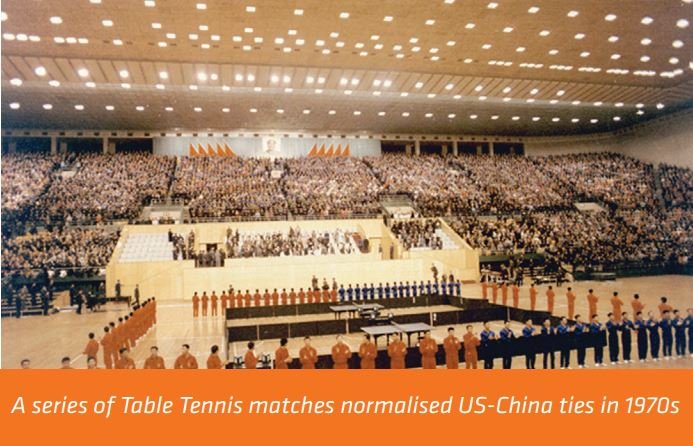
India capitalize the regional curiosity and popularity of the game very much to counter its rivalry with Pakistan. In 2007, Indian Premiere League or IPL was founded as a franchise T20 style tournament, which became astounding financial success. Since then, India has become the strongest stakeholder of the game.
THE GAME OF BOYCOTTING
During the Cold War era, Olympics were boycotted six times from 1956 to 1988. Let it be for Communism vs Democracy, East vs West; Olympic games have been leveraged by boycotting to further geopolitical agendas. The 1976 Montreal Games were boycotted by 34 countries, 1980 Moscow Games by 66 countries and 1984 Los Angeles games were by 18 countries. 1976 games were mostly boycotted by African countries who protested OIC’s failure to act against New Zealand who send a Rugby team to South Africa who faced worldwide sporting boycott for the apartheid regime. The 1980 and 1984 were reciprocated by Western blocs led by USA and Communist bloc led by Soviet Union.
This practice of boycotting took a hiatus post Cold War era but seems to have resumed by the boycott of 2022 Beijing Winter Olympics. Prior to that Russian Federation, the legal successor of the Soviet Union was put on suspension by OIC due to alleged widespread doping scandal by Russian Olympic Committee. On the aftermath Russian invasion of Ukraine broke-out in February this year, Russia has been banned from almost entire sporting community and sporting governing organizations.
In both cases of Russia and China, the call originated from the West who pointed alleged human rights violation, border encroachment and suppression free speech as a reason. It must be pointed out that almost all the biggest governing organizations such as OIC, FIFA etc all have their headquarters based in western Europe and have been dominated by western bloc in leadership. While Russia’s action in Ukraine must be condemned, it can be pointed that the sporting community failed to act when US and western allies forced wars in Afghanistan and Iraq in very recent memory. Thus, again with the Coubertin commentary kept in mind, it is safe to say that the organized sporting structure was created and have been used for geopolitical strategies in mind.
SPORTS: THE LIGHT OF HOPE
Sports in its truest form is one of the most potent tools of bringing humans together. During first world war, during Christmas the British and German players made a truce to stop fighting and play football matches instead. In late 90s the nuclear race between India and Pakistan was at full force with Kargil War in the foreground. The cricketing diplomacy, where both countries team visited each other successfully defused the building tension. Iconic players such as boxer Muhammad Ali made headline by bringing social injustices faced by African American in forefront of world news and helped their civil rights movement.
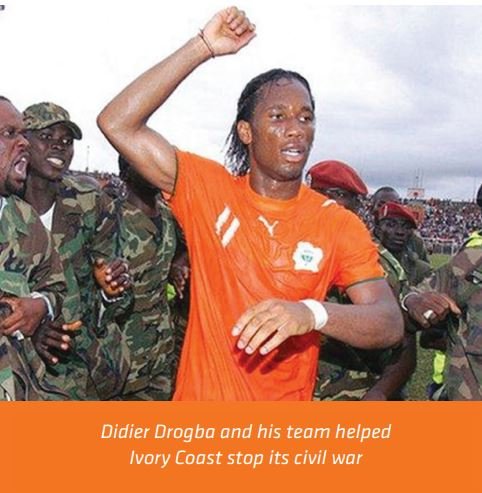
Ivory Coast was marred in a 5 year long brutal civil war. But when they qualified for 2006 FIFA World Cup, their captain Didier Drogba made a passionate speech, “Men and women of Ivory Coast. From the north, south, centre, and west, we proved today that all Ivorians can coexist and play together with a shared aim – to qualify for the World Cup. We promised you that the celebrations would unite the people – today we beg you on our knees.” The players fell to their knees. “The one country in Africa with so many riches must not descend into war. Please lay down your weapons and hold elections,” Drogba finished.
The players then rose and sang: “We want to have fun, so stop firing your guns!” The words had a huge effect, eventually helping the two warring sides to the negotiating table where a ceasefire was signed.
With judging the human and sports history, it can be concluded that sports and politics will always be mixed. The Olympic Charter is a beautiful codification of human rights and peace. But the pervasive reasons behind this, as we discussed Coubertin commentary, goes to opposite cause. Sports as we know can be a strongest tool for global peace and harmony. It is up to the leaders and politicians to how to use it and for sports lovers to watch out for how it is being used.

